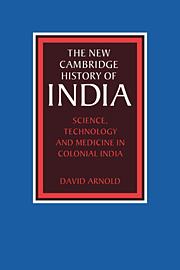Book contents
- Frontmatter
- 1 Introduction: science, colonialism and modernity
- 2 Science under the company
- 3 Western medicine in an Indian environment
- 4 Technologies of the steam age
- 5 Imperial science and the Indian scientific community
- 6 Science, state and nation
- Conclusion
- Biographical notes
- Bibliographical essay
- Index
- THE NEW CAMBRIDGE HISTORY OF INDIA
- References
2 - Science under the company
Published online by Cambridge University Press: 28 March 2008
- Frontmatter
- 1 Introduction: science, colonialism and modernity
- 2 Science under the company
- 3 Western medicine in an Indian environment
- 4 Technologies of the steam age
- 5 Imperial science and the Indian scientific community
- 6 Science, state and nation
- Conclusion
- Biographical notes
- Bibliographical essay
- Index
- THE NEW CAMBRIDGE HISTORY OF INDIA
- References
Summary
The English East India Company was as old as modern science itself. Founded in 1600, the Company shared its early years with the Scientific Revolution, and by 1662, when the Royal Society of London was founded, was already a flourishing concern with trading bases at Surat, Madras and Masulipatam. The sciences prominent in early colonial India – botany, geology, to a lesser extent zoology – were still at a formative stage when the Company embarked on its career of territorial expansionism in the mid-eighteenth century. The first volume of Buffon’s Histoire naturelle appeared in 1749, as Anglo-French rivalry in the Carnatic was reaching its peak; Linnaeus’s Species plantarum, which established the binomial system of nomenclature, was published in 1753, four years before the battle of Plassey opened the floodgates to British ascendancy in Bengal. By the time the Geological Society of London, model for a new generation of metropolitan scientific societies, was founded in 1807, British power had been extended over vast tracts of northern and peninsular India and was poised for the final defeat of the Marathas. The publication in 1830 of the first volume of Lyell’s Principles of Geology, one of the foundational texts of modern geology, came three years before the Company lost its vestigial trading rights; and Darwin’s Origin of Species was published in November 1859, twelve months after the East India Company had finally been declared extinct.
- Type
- Chapter
- Information
- Science, Technology and Medicine in Colonial India , pp. 19 - 56Publisher: Cambridge University PressPrint publication year: 2000

